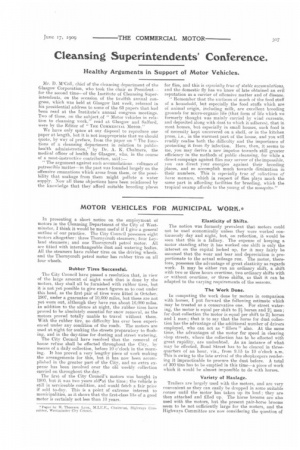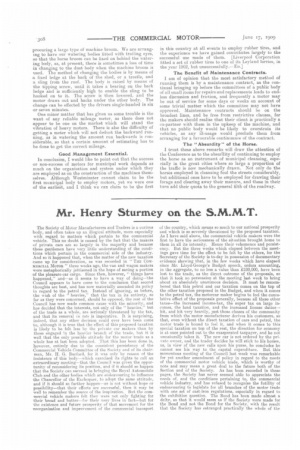MOTOR VEHICLES FOR MUNICIPAL WORK.* In presenting a short notice
Page 19

Page 20

If you've noticed an error in this article please click here to report it so we can fix it.
on the employment of motors in the Cleansing Department of the City of Westminster, I think it would be most useful if I give a general outline of our practice. The City Council possesses eight motors altogether three Thornycroft steamers; four Leyland steamers; and one Thornycroft petrol motor. All are fitted with interchangeable dust and watering bodies. All the steamers have rubber tires on the driving wheels. and the Thornycroft petrol motor has rubber tires on all four wheels.
Rubber Tires Successful.
The City Council have passed a resolution that, in view of the large amount of night work that is done by the motors, they shall all be furnished with rubber tires, but it is not yet possible to give exact figures as to cost under this head, as the first pair of tires were fitted in October, 1907, under a guarantee of 10,000 miles, but these are not yet worn out, although they have run about 16,000 miles. in addition to the silence at night, the rubber tires have proved to be absolutely essential for snow removal, as the motors proved totally unable to travel without them. With the rubber tire, no difficulty has ever been experienced under any condition of the roads. The motors are used at night for soaking the streets preparatory to flushing, and in the day-time for dusting and street watering.
The City Council have resolved that the removal of house refuse shall be effected throughout the City, by means of a daily collection, before 10 o'clock in the morning. It has proved a very lengthy piece of work making the arrangements for this, but it has now been accomplished in the greater part. of the City, and no extra expense has been involved over the old weekly collection carried on throughout the day.
The first of the City Council's motors was bought in 1900, hut it was two years oleat the time ; the vehicle is still in serviceable condition, and would fetch a fair price if sold to-day. This is a point, of extreme interest to municipalities, as it shows that the first-class life of a good motor is certainly not less than 10 years.
Elasticity of Shifts.
The notion was formerly prevalent that motors could not be used economically unless they were worked continuously day and night, but, on reflection, it would be seen that this is a fallacy. The expense of keeping a motor standing after it has worked one shift is only the interest on the capital locked up, for it may fairly be assumed that the wear and tear and depreciation is proportionate to the actual mileage run. The motor, therefore, possesses the advantage of great elasticity as regards work. It may be either run an ordinary shift, a shift with two or three hours overtime, two ordinary shifts with or without overtime, or three shifts, so that it can be adapted to the varying requirements of the seasons.
The Work Done.
In computing the work done by motors in comparison with horses, I put forward the following estimate which may be treated as a conservative one. For street watering, the motor is equal per shift to 2 horses and 2!,i men ; for dust collection the motor is equal per shift to 24horses and 1 man ; that is to say that the horse for dust collection has the advantage of the additional number of drivers employed, who can act as " fillers " also. At the same time, the advantages of the motor for speed in clearing shop streets, where the collection has to be effected with great rapidity, are undoubted. As an instance of what may be effected, Bond Street has to be cleared in threequarters of an hour, viz., from 9.15 to 10 o'clock a.m. This is owing to the late arrival of the shopkeepers rendering it impracticable to procure the dust before. A total of 300 tins has to be emptied in this time—.a piece of work which it would be almost impossible to do with horses.
Variety of Haulage.
Trailers are largely used with the motors, and are very convenient as they can easily be dropped in some suitable corner until the motor has taken up its load ; they are then attached and filled up. The horse brooms are also used with the motors, but the present pair-horse brooms seem to be not sufficiently large for the motors, and the Highways Committee are now considering the question of procuring a large type of machine broom. We are arranging to have our watering bodies fitted with trailing eyes, so that the horse broom can be fixed on behind the watering body, as, at present, there is sometimes a loss of time in changing to the dust body when the machine broom is used. The method of changing the bodies is by means of a fixed ledge at the back of the shed, or a trestle, and a sling from the roof. The body is raised by means of the tipping screw, until it takes a bearing on the back ledge and is sufficiently high to enable the sling to he hooked on to it. The screw is then lowered, and the motor draws out and backs under the other body. The change can be effected by the drivers single-handed in six or seven minutes.
One minor matter that has given us some trouble is the want of any reliable mileage meter, as there does not appear to be one on the market which will stand the vibration of heavy motors. There is also the difficulty of getting a meter which will not deduct the backward running, as in watering the amount run backwards is considerable, so that a certain amount of estimating has to be done to get the correct mileage.
Good Management Essential.
In conclusion, I would like to point out that the success or non-success of motors for municipal work depends as much on the organisation and system under which they are employed as on the construction of the machines themselves. Although Westminster cannot claim to be the first municipal body to employ motors, yet we were one of the earliest, and I think we can claim to be the first
in this country at all events to employ rubber tires, and the experience we have gained contributes largely to the successful use made of them. fLiverponl Corporation fitted a set of rubber tires to one of its Leyland lorries, in the year 1902, but unsuccessfully.—ED.]
The Benefit of Maintenance Contracts.
I am of opinion that the most satisfactory method of running them is by a maintenance contract, as the continual bringing up before the committees of a public body of all small items for repairs and replacements leads to endless discussion and friction, and frequently a motor may be out of service for some days or weeks on account of some trivial matter which the committee may not have approved. Maintenance contracts should be on the broadest lines, and be free from restrictive clauses, for the makers should realise that their client is practically a co-partner with them in the upkeep of the machine, and that no public body would be likely to overstrain its vehicles, as any ill-usage would preclude them from arranging for a favourable continuance of the contract.
The " Absurdity " of the Horse.
I trust these above remarks will draw the attention of the Conference as to the absurility of continuing to employ the horse as an instrument of municipal cleansing, especially in the great cities where so large a proportion of the traffic is now mechanically drawn. Not only do the horses employed in cleansing foul the streets considerably, but additional ones have to be employed for drawing their forage and clearing away their manure, and these in their turn add their quota to the general filth of the roadway.
























